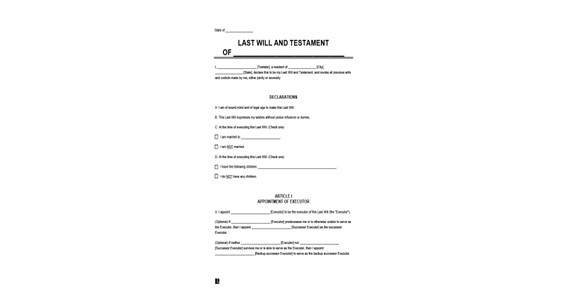Are you planning to write your own will? If yes, then you must know how to write a will. The main purpose of writing or making a will is to choose beneficiaries to receive all of your assets. These beneficiaries can be your family members, loved ones, or an organization. Today, I will teach you how to write a living will at home. Here, I have divided the whole procedure into nine steps. You can keep on reading further to learn how to write a will in detail.
How To Write A Will?
Writing a will helps to ease the burden on your family and loved ones. Below, I have listed nine steps that will help you to learn how to write a will and testament.
- Step 1: Choose An Executor
- Step 2: Make Detailed Property Records
- Step 3: Decide Your Beneficiaries
- Step 4: Appoint Guardians For Minors
- Step 5: Make A Plan For Your Pets
- Step 6: Protect Your Digital Legacy
- Step 7: Put Your Will On Paper
- Step 8: Change Or Update Your Will If Needed
- Step 9: Abide By Your State’s Estate Laws
You can keep on reading further to understand how to write a will without a lawyer.
Step By Step Guide To Write A Will
In this section, you will get to learn how to write a last will and testament in detail.
Step 1: Choose An Executor
First, you have to choose an executor whom you can trust. Typically, an executor is a person who will be in charge of handling your estate. This person will know where to find your important documents such as your will, insurance policies, and password for online accounts.
Step 2: Make Detailed Property Records
The next step is to make a comprehensive list of who gets what. Usually, a will can cover any real and personal property of the testator. For example, real property includes houses, land, and other immovable property. While personal property includes bank accounts, stocks, jewelry, and other items.
Step 3: Decide Your Beneficiaries
Now, it’s time to choose your beneficiaries. As I have mentioned earlier, beneficiaries are those who will inherit your real and personal property according to your will. You can also name an alternate beneficiary in case the primary beneficiary dies.
Step 4: Appoint Guardians For Minors
In case you have small children, you must appoint a guardian who gets custody of the minor children. This option is suitable for any minor children under 18. Make sure you inform the chosen guardian and confirm that they will agree to step in and take care of your children.
Step 5: Make A Plan For Your Pets
Pets are like family members. But under the law, they are considered personal property. In your will, you can include detailing who should take the responsibilities for your pets.
Step 6: Protect Your Digital Legacy
Apart from this, it’s also important to consider what happens to your social media accounts in your absence. Make sure you are 100% sure before sharing any relevant login information. In your will, mention that your executor or loved one can take care of your digital legacy to your liking.
Step 7: Put Your Will On Paper
Now, it’s time to put your will on paper. While writing you will be specific and realistic. Make sure you use clear language and exact names while deciding who gets what. This will help you to avoid conflicts while splitting things equally.
Step 8: Change Or Update Your Will If Needed
If you wish to make any changes, you can make changes in your will that bear with your and relevant witness signatures. You can also rewrite your will completely if there are major changes. And if you make changes in your will, make sure your updated copies are also signed by the witnesses.
Step 9: Abide By Your State’s Estate Laws
Different states have different laws. This includes how many witnesses are needed, who can serve as a witness, and so on. So, make sure you will follow your state’s laws.
You can follow the same procedure for how to write a will in Texas, California, and PA (Pennsylvania).
Here, I have even attached how to write a will sample/format.

You can learn much more on various topics on prozgo.com
FAQ
Can I Make My Own Will Without A Lawyer?
There is no need for a will to be drawn up or witnessed by a solicitor. If you wish to make a will yourself, you can do so. However, you should only consider doing this if the will is going to be straightforward.
Does A Will Need To Be Registered?
No, there is no legal requirement to register a will. It doesn’t even have to be on a stamp paper or notarised.
Can I Write A Letter Instead Of A Will?
A letter of instruction is a cheat sheet for anyone involved in settling your affairs. Unlike a will, this letter has no legal authority. However, it can provide an easy-to-understand explanation of your overall estate plan to your executor and lay out your wishes to your family for things not covered by the will.
What Should I Leave In My Will?
It only makes sense that you would want to make sure to leave it to the right person (or people). Other notable assets to take stock of before finalizing your Will are your vehicle, family heirlooms, cash, bank accounts, retirement funds, stock options, and any other valuable possessions.
What Is A Good Substitute For A Will?
A living trust (also known as a “revocable trust” or “inter vivos trust”) can be an alternative to a will. Like a will, a living trust may direct the distribution of your property upon your death. And, like a will, a living trust may be altered, or revoked, at any time prior to your death.
What Are The Main Rules Of Writing A Will?
In most states, you must be 18 years of age or older. A will must be written in sound judgment and mental capacity to be valid. The document must clearly state that it is your will. An executor of your will, who ensures your estate is distributed according to your wishes, must be named.
Does A Will Have To Be Filed In Kansas?
In Kansas, a will must be filed within six months of the decedent’s death. An estate may be eligible for a simplified probate process; factors the court considers in such a decision may include the following: Size of the estate. Degree of kinship of the heirs.
Conclusion
In the above post, I have explained how a will should be written. A basic will is the value of your possessions after you’re gone. This is one of the most important documents that account for your wishes. While writing a will make sure you do not miss any of the above-mentioned steps. Make sure you share the updated changes in your will with your executor. Thus, you can now easily write a will on your own by learning how to write a will.
To Know Some Great Stuff Do Visit HindiVeda
To Know Some Great Stuff Do Visit HowTat
To Know Some Great Stuff Do Visit IncludedNews
To Know Some Great Stuff Do Visit IndiaPlus
How do you write a will format
